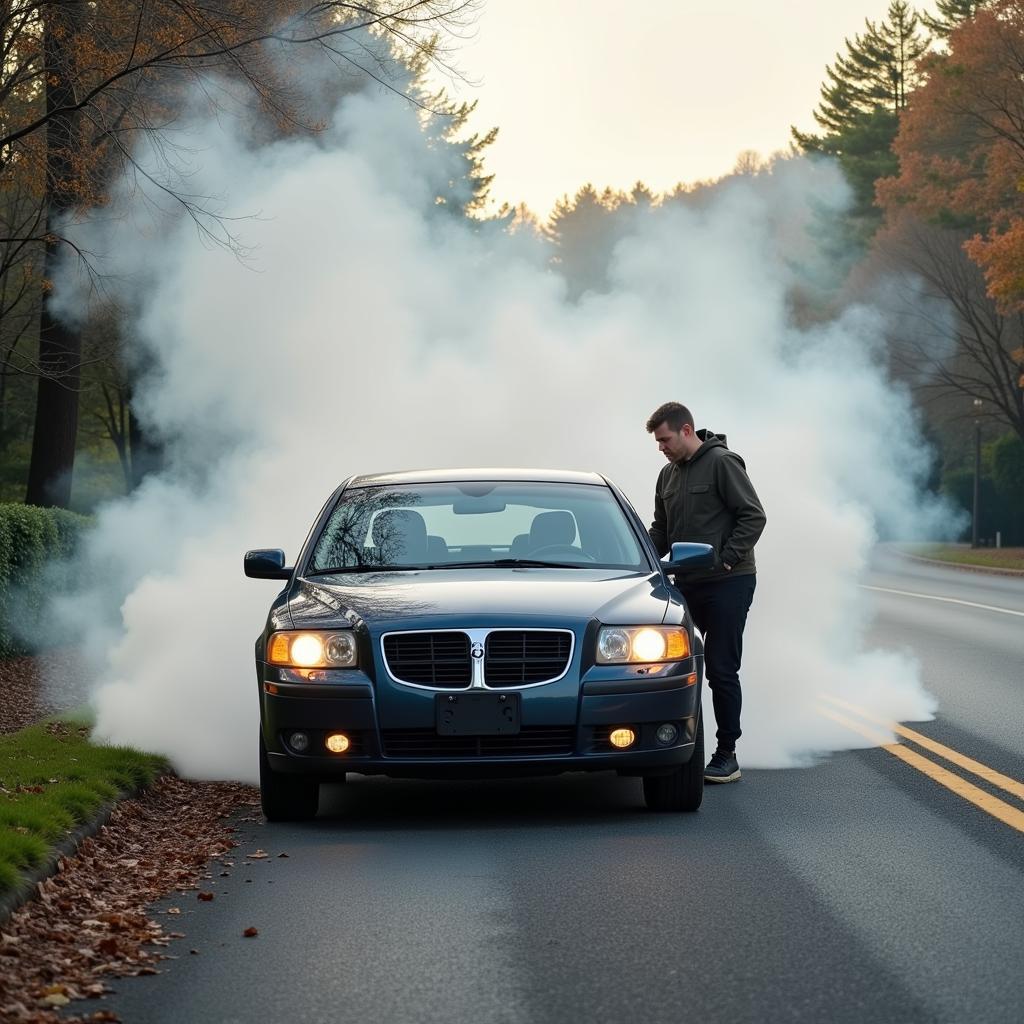That annoying squeal coming from your brakes? It’s not just irritating; it’s often a cry for help from your car. Fix Car Brakes Squeaking before it becomes a bigger, more expensive problem. This guide offers practical solutions for car owners, mechanics, and technicians to diagnose and resolve brake squeaking issues.
Understanding Why Your Car Brakes Squeak
Brake squeaking can be caused by a variety of factors, ranging from simple wear and tear to more serious mechanical issues. Identifying the root cause is the first step to effectively fixing the problem.
Common Causes of Squeaking Brakes
- Worn Brake Pads: This is the most common culprit. As brake pads wear down, a small metal indicator can contact the rotor, causing a high-pitched squeal. Think of it like a warning whistle letting you know it’s time for new pads.
- Glazed Brake Pads: Sometimes, excessive heat can cause the brake pad material to harden and become “glazed.” This creates a smooth surface that can squeak against the rotor.
- Rust on Rotors: Moisture, especially overnight or after rain, can cause a thin layer of rust to form on the brake rotors. This rust can cause squeaking until it’s worn off by the brake pads.
- Dust and Debris: Dirt, dust, and road debris can get lodged between the brake pads and rotors, leading to squeaking or grinding noises.
- Lack of Lubrication: The various components of the brake system, such as caliper slides and pins, require lubrication to function smoothly. Lack of lubrication can cause squeaking and other noises.
- Worn Rotors: Over time, brake rotors can wear down and develop grooves or become warped. This can contribute to squeaking and reduced braking performance.
- Cheap Brake Pads: Lower-quality brake pads may contain metallic components that are more prone to squeaking.
How to Fix Car Brakes Squeaking
Now that we’ve covered the potential causes, let’s dive into the solutions.
Replacing Brake Pads
If your brake pads are worn, replacing them is the most effective solution. This involves removing the old pads and installing new ones, along with resurfacing or replacing the rotors if necessary. How to fix a flexible wire for my car?
Resurfacing or Replacing Rotors
If your rotors are warped or excessively worn, resurfacing or replacing them is essential. Resurfacing involves machining the rotors to create a smooth, even surface. However, if the rotors are too thin, they’ll need to be replaced.
Cleaning and Lubricating Brake Components
Cleaning the brake components and applying appropriate lubrication to caliper slides and pins can eliminate squeaking caused by friction. Be sure to use a brake-specific lubricant.
Installing Anti-Squeal Shims or Grease
Applying anti-squeal shims or a thin layer of high-temperature brake grease to the back of the brake pads can help dampen vibrations and reduce squeaking.
Choosing High-Quality Brake Pads
Investing in high-quality brake pads from reputable brands can minimize the likelihood of squeaking. Look for ceramic or semi-metallic pads known for their quiet operation.
“A little preventative maintenance goes a long way,” says John Smith, Senior Automotive Technician at Smith’s Auto Repair. “Regular brake inspections and cleaning can prevent many squeaking issues before they even start.”
Why are my brakes squeaking after rain?
Moisture can cause a thin layer of rust to form on the brake rotors, leading to squeaking. This usually disappears after a few brake applications.
What does it mean if my brakes squeak when I press lightly?
This can indicate worn brake pads, glazed pads, or dust and debris between the pads and rotors.
How much does it cost to fix squeaky brakes?
The cost varies depending on the cause and the necessary repairs. It can range from a simple cleaning and lubrication to the cost of new brake pads and rotors.
Conclusion
Fix car brakes squeaking promptly to ensure optimal braking performance and safety. While some causes are simple to address, others require professional attention. If you’re unsure about the cause or the best course of action, don’t hesitate to contact AutoTipPro for expert advice and assistance. You can reach us at +1 (641) 206-8880 or visit our office at 500 N St Mary’s St, San Antonio, TX 78205, United States.
“Ignoring squeaky brakes can lead to more serious problems down the road,” adds Jane Doe, Lead Mechanic at Doe’s Auto Services. “Addressing the issue early can save you money and headaches in the long run.” How to fix a flexible wire for my car?
FAQ
- Can squeaky brakes be dangerous? While squeaking itself isn’t always dangerous, it can indicate underlying issues that could compromise braking performance.
- How often should I check my brakes? It’s recommended to have your brakes inspected at least once a year or every 12,000 miles.
- Can I fix squeaky brakes myself? Simple fixes like cleaning and lubrication can be done DIY, but more complex issues require professional expertise.
- What type of brake pads are best? Ceramic or semi-metallic pads are generally preferred for their quiet operation and performance.
- How long do brake pads last? Brake pad lifespan varies depending on driving habits and conditions, but they typically last between 25,000 and 70,000 miles.
- What is brake rotor resurfacing? Resurfacing involves machining the rotor surface to remove imperfections and create a smooth, even braking surface.
- Do I need to replace my rotors when I replace my brake pads? Not always, but it’s often recommended to resurface or replace rotors to ensure optimal braking performance.





Leave a Reply